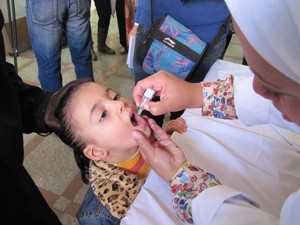
For Immediate Release
This week, 14.3 million Egyptian children under the age of 5 will be vaccinated against polio in the Ministry of Health and Population’s national polio immunization campaign. The U.S. Agency for International Development (USAID) is contributing to the overall goal of sustaining Egypt’s polio-free status by supporting the logistics and operations of the campaign.
“USAID worked for years to help to eliminate polio in Egypt. When Egypt was declared polio-free in 2006, the American people cheered alongside the Egyptian people,” said Dr. Mary C. Ott, USAID/Egypt’s Mission Director. “We will continue to work side by side with the Egyptian people to prevent polio from returning to Egypt.”
Polio is a crippling disease which causes permanent disability. It primarily infects young children, who can be easily protected by receiving two drops of oral polio vaccine. The last case of polio in Egypt was in May 2004 and it was declared a polio-free country in 2006. However, the total number of cases globally has increased in recent years and 75 percent of reported cases are in the eastern Mediterranean region. While routine immunization remains a national priority in Egypt, national immunization campaigns provide additional protection for children and help prevent polio from returning to Egypt. The Ministry of Health and Population is conducting two rounds of a national polio immunization campaign this year, in April and October.
Over the past thirty years, the U.S. government through USAID has worked with the Egyptian people to achieve significant, positive results. In addition to helping to eliminate polio, the American people have contributed to infrastructure projects that have provided water, electricity, and telephone services to nearly all of Egypt; education projects that have contributed to doubling the number of girls in schools; and health projects that have led to an 80 percent reduction in infant mortality.







Comment
Make a general inquiry or suggest an improvement.